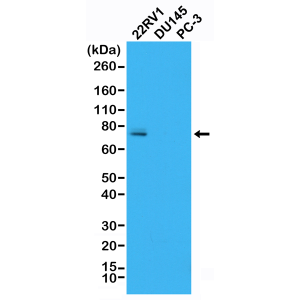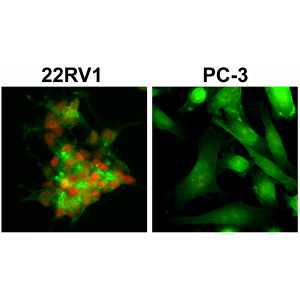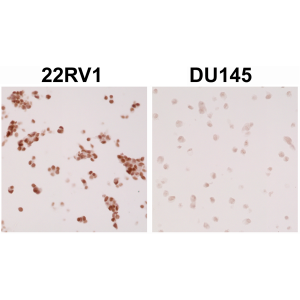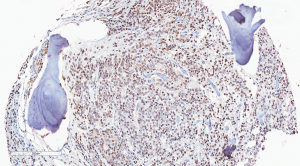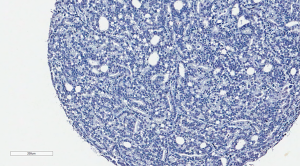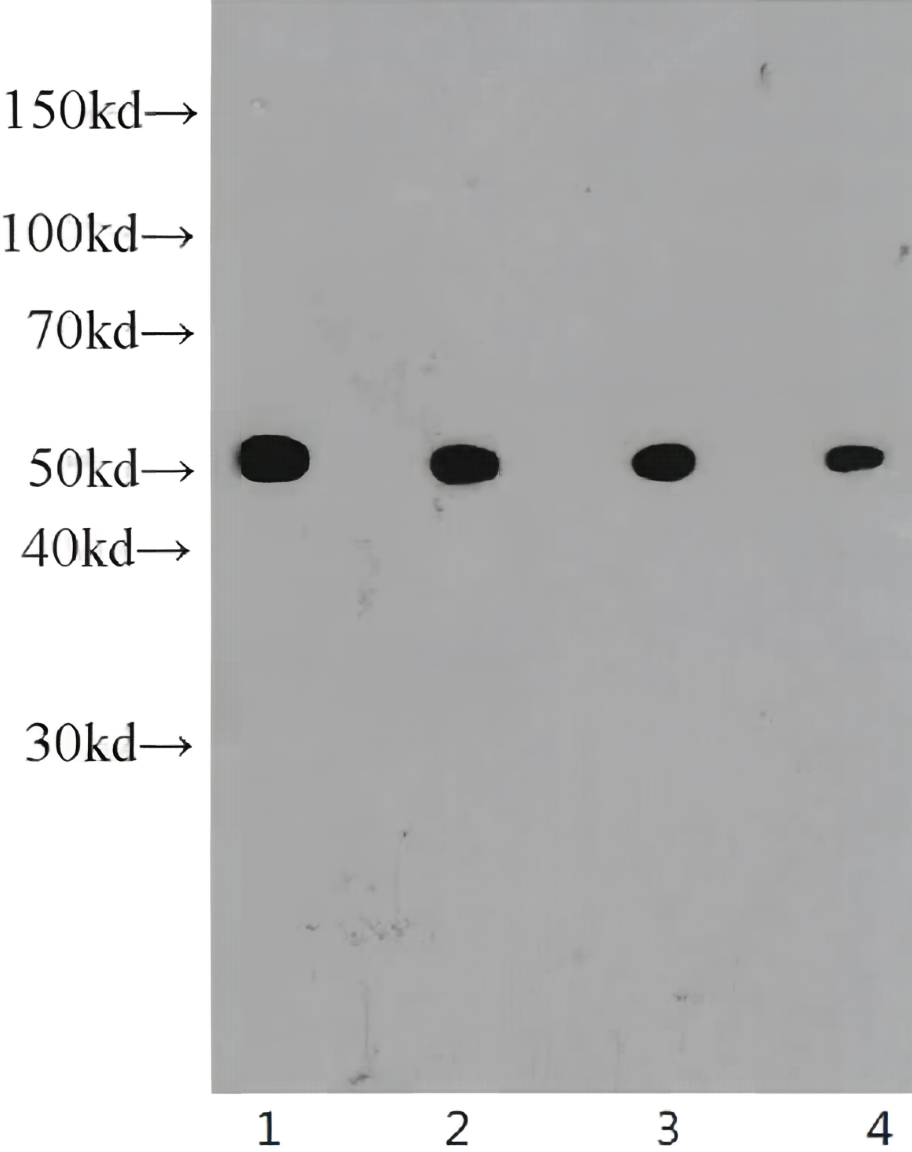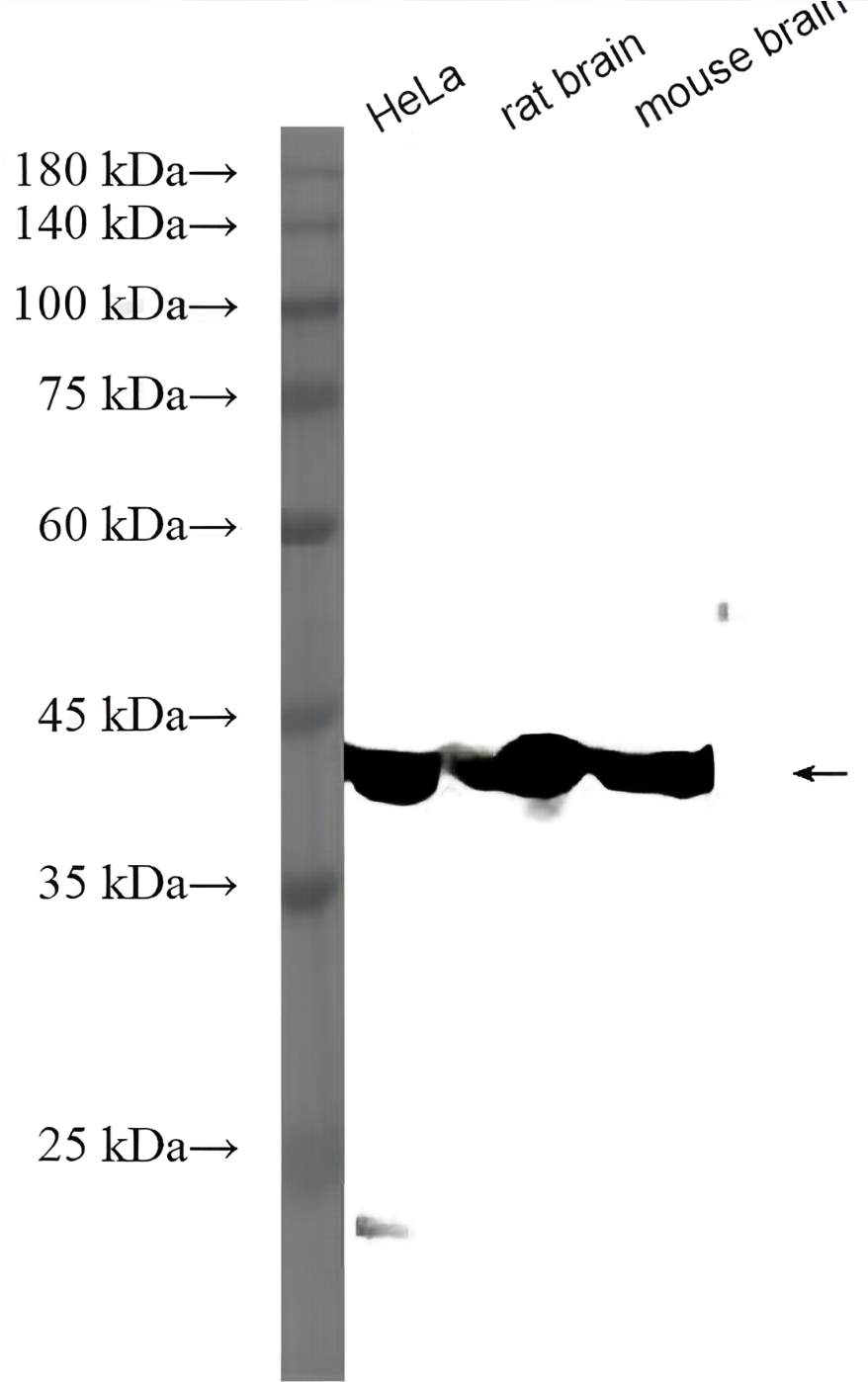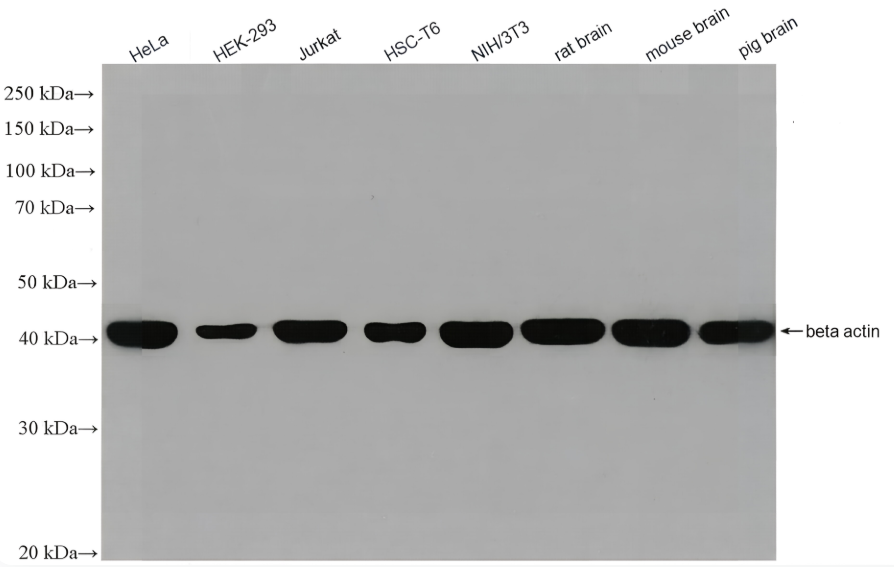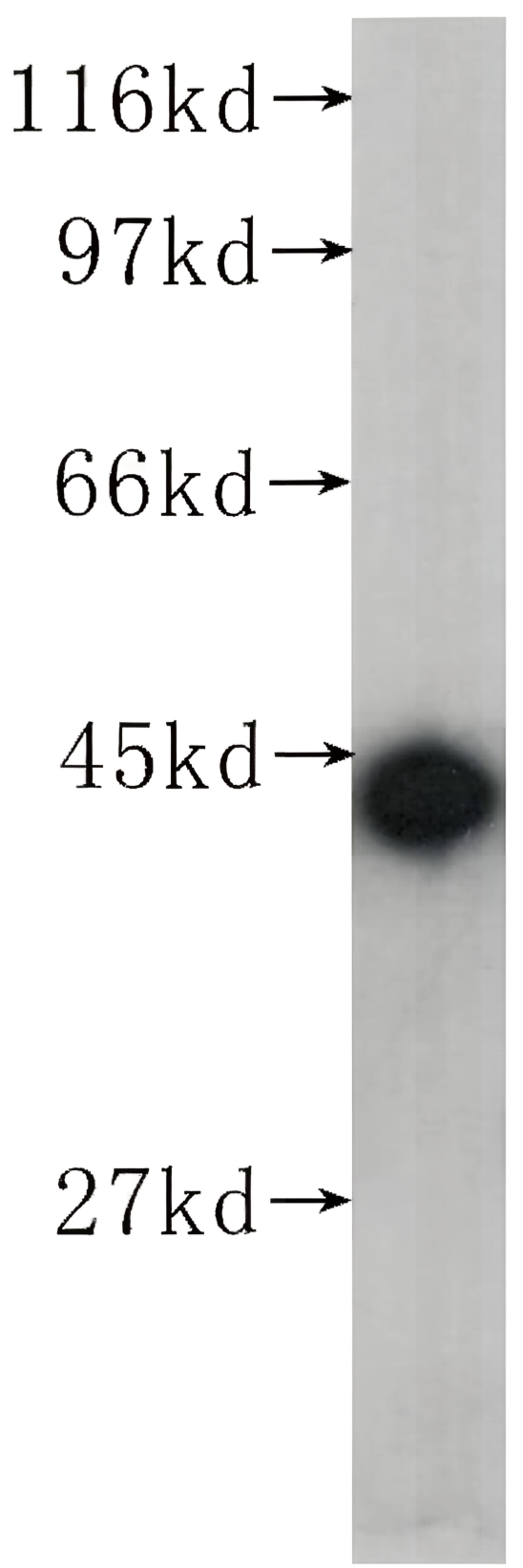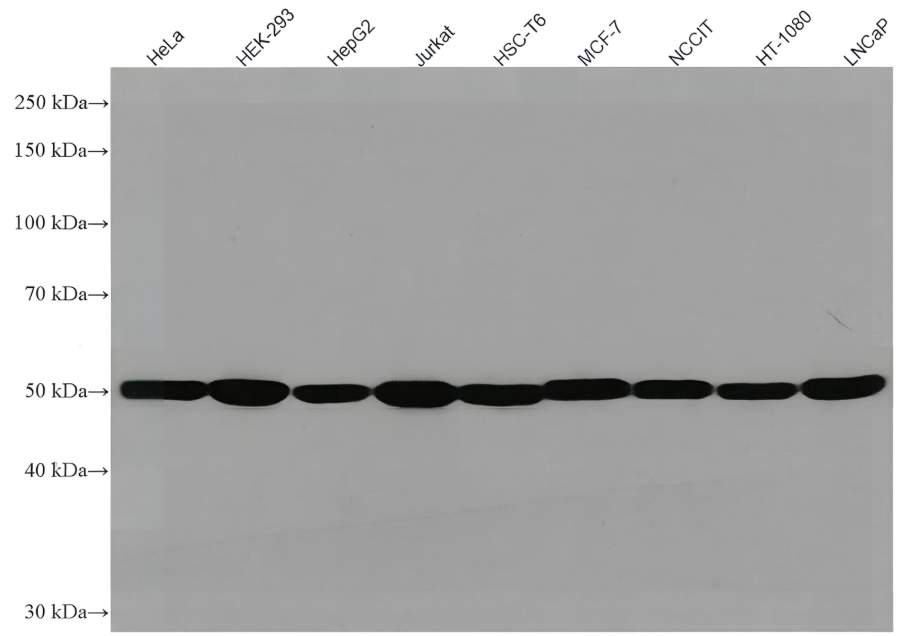Anti-Androgen Receptor (AR-V7 specific) Rabbit Monoclonal Antibody [Clone RM7]; ARv7 Splice Variant; 31-1109-00, 31-1109-02
CAT.NO. : 31-1109-02
US$ Please choose
US$ Please choose
Conjugation:
Trail, Bulk size or Custom requests Please contact us
*产品价格可能会有所调整,请以品牌方官网实时更新的价格为准,以确保准确性。
Product Details
| Product Name | Anti-Androgen Receptor (AR-V7 specific) Rabbit Monoclonal Antibody, Clone RM7 |
| Product Description | Rabbit monoclonal to Androgen Receptor (AR-V7 specific), ARv7 Splice Variant |
| Catalog No. | 31-1109-00; 31-1109-02 |
| Clone Name | RM7 |
| Product Data Sheet | Anti-Androgen Receptor (AR-V7 specific) Rabbit Monoclonal Antibody Data Sheet RM7 Biotinylated Anti-Androgen Receptor (AR-V7 specific) Rabbit Monoclonal Antibody Data Sheet RM7 |
| Specificity | RM7 reacts to androgen receptor splice variant 7 (AR-V7). No cross reactivity with wild type androgen receptor. |
| Immunogen | A peptide corresponding to AR splice variant 7 |
| Application | Immunohistochemistry Immunocytochemistry Immunoprecipitation Western Blot Chromatin IP Circulating Tumor Cells Flow Cytometry |
| Species Reactivity | Human |
| Conjugate | None |
| Intended Use | Research Use Only |
| . | |
Properties
| Form | Liquid |
| Storage Instructions | Store at -20.0°C |
| Stability | Stable for 1 Year at -20.0°C from date of receipt |
| Storage Buffer | 50% Glycerol/PBS with 1% BSA and 0.09% sodium azide |
| Volume/Item Size | 100 µL; Biotinylated 50 µL |
| Purity | Protein A affinity purified from an animal origin–free culture supernatant |
| Clone Type | Monoclonal |
| Isotype | Rabbit IgG |
| Usage | Immunohistochemistry (IHC): 1:500 – 1:1000 dilution; Immunocytochemistry (ICC): 1:100 – 1:1000 dilution; Western Blot (WB): 1:500 – 1:1000 dilution. |
| References for ARv7 Splice Variant antibody [RM7] | Sowalsky AG et al AR-V7 in Primary Prostate Cancer. MedRxiv. (2022), 10.1101/2022.03.10.22271799. WB, IHC; Human. Read more (AR-V7 in Primary Prostate Cancer) Hu Qet al. Inhibition of CDK9 activity compromises global splicing in prostate cancer cells. RNA BIOLOGY. (2021), 10.1080/15476286.2021.1983287. WB; Human. Read more (PubMed: 34592899) Brady L et al Inter- and intra-tumor heterogeneity of metastatic prostate cancer determined by digital spatial gene expression profiling. Nat Commun. (2021), 10.1038/s41467-021-21615-4. IHC; Human. Read more (PubMed: 33658518) Sugiura M et al. Identification of AR-V7 downstream genes commonly targeted by AR/AR-V7 and specifically targeted by AR-V7 in castration resistant prostate cancer. Transl Oncol. (2020), 10.1016/j.tranon.2020.100915. WB; Human. Read more (PubMed: 33096335) Xu S et al. p300-Mediated Acetylation of Histone Demethylase JMJD1A Prevents Its Degradation by Ubiquitin Ligase STUB1 and Enhances Its Activity in Prostate Cancer. Cancer Res. (2020), 10.1158/0008-5472.CAN-20-0233. WB; Human. Read more (PubMed: 32522824) Yoshizawa A et al. Combined a-methylacyl-CoA racemase inhibition and docetaxel treatment reduce cell proliferation and decrease expression of heat shock protein 27 in androgen receptor-variant-7epositive prostate cancer cells.. Prostate International. (2020), 10.1016/j.prnil.2020.07.001. WB; Human. Read more (Prostate International) Labib M et al. Tracking the expression of therapeutic protein targets in rare cells by antibody-mediated nanoparticle labelling and magnetic sorting. Nat Biomed Eng. (2020), 10.1038/s41551-020-0590-1. FC; Human. Read more (PubMed: 32719513) Hirayama Yet al. Combination therapy with androgen receptor N-terminal domain antagonist EPI-7170 and enzalutamide yields synergistic activity in AR-V7-positive prostate cancer. Mol Oncol. (2020), 10.1002/1878-0261.12770. WB; Human. Read more (PubMed: 32734688) Gjyrezi A et al. Taxane resistance in prostate cancer is mediated by decreased drug-target engagement. J Clin Invest. (2020), 10.1172/JCI132184. IHC; Human. Read more (PubMed: 32478682) Nappi L et al. Ivermectin inhibits HSP27 and potentiates efficacy of oncogene targeting in tumor models. J Clin Invest. (2020), 10.1172/JCI130819. WB; Human. Read more (PubMed: 31845908) Ylitalo EB et al. Marked response to cabazitaxel in prostate cancer xenografts expressing androgen receptor variant 7 and reversion of acquired resistance by anti-androgens. Prostate. (2020), 10.1002/pros.23935. IHC; Human. Read more (PubMed: 31799745) Lu C et al. Androgen receptor variant-driven prostate cancer II: advances in laboratory investigations. Prostate Cancer Prostatic Dis. (2020), 10.1038/s41391-020-0217-3. IHC; Human. Read more (PubMed: 32139878) Berger A et al. N-Myc-mediated epigenetic reprogramming drives lineage plasticity in advanced prostate cancer. J Clin Invest. (2019), 10.1172/JCI127961. WB; Human. Read more (PubMed: 31260412) Sharp A et al. Clinical Utility of Circulating Tumour Cell Androgen Receptor Splice Variant-7 Status in Metastatic Castration-resistant Prostate Cancer. Eur Urol. (2019), 10.1016/j.eururo.2019.04.006. IHC; Human. Read more (PubMed: 31036442) Zadra G et al. Inhibition of de novo lipogenesis targets androgen receptor signaling in castration-resistant prostate cancer. Proc Natl Acad Sci U S A. (2019), 10.1073/pnas.1808834116. IHC, WB; Human. Read more (PubMed: 30578319) Sowalsky AG et al. Neoadjuvant-Intensive Androgen Deprivation Therapy Selects for Prostate Tumor Foci with Diverse Subclonal Oncogenic Alterations. Cancer Res. (2018), 10.1158/0008-5472.CAN-18-0610. IHC, ISH; Human. Read more (PubMed: 29921690) Cato L et al. ARv7 Represses Tumor-Suppressor Genes in Castration-Resistant Prostate Cancer. Cancer Cell. (2019), 10.1016/j.ccell.2019.01.008. IHC-F, WB; Human. Read more (PubMed: 30773341) Bai S et al. A positive role of c-Myc in regulating androgen receptor and its splice variants in prostate cancer. Oncogene. (2019), 10.1038/s41388-019-0768-8. WB; Human. Read more (PubMed: 30820039) Sharp A et al. Androgen receptor splice variant-7 expression emerges with castration resistance in prostate cancer. J Clin Invest. (2018) 10.1172/JCI122819. IHC-P, IP, WB; Human. Read more (PubMed: 30334814) Zhao P et al. Detection of androgen receptor (AR) and AR-V7 in small cell prostate carcinoma: Diagnostic and therapeutic implications. Asian J Urol. (2018), 10.1016/j.ajur.2018.09.003. WB, IHC-P; Human. Read more (Asian J Urol. AJUR244) Russo JW et al. Downregulation of Dipeptidyl Peptidase 4 Accelerates Progression to Castration-Resistant Prostate Cancer. Cancer Res. (2018), 10.1158/0008-5472.CAN-18-0687. IHC-P; Human. Read more (PubMed: 30242112) Yang RK et al. Expression pattern of androgen receptor and AR-V7 in androgen deprivation therapy naïve salivary duct carcinomas. Hum Pathol. (2018), 10.1016/j.humpath.2018.09.009. IHC-P; Human. Read more (PubMed: 30267779) Lawrence MG et al. Patient-derived Models of Abiraterone- and Enzalutamide-resistant Prostate Cancer Reveal Sensitivity to Ribosome-directed Therapy. Eur Urol. (2018) 10.1016/j.eururo.2018.06.020. IHC-P; Human. Read more (PubMed: 30049486) Kallio HML et al. Constitutively active androgen receptor splice variants AR-V3, AR-V7 and AR-V9 are co-expressed in castration-resistant prostate cancer metastases. Br J Cancer. (2018) 10.1038/s41416-018-0172-0. IHC-P; Human. Read more (PubMed: 29988112) Zhao Pet al. Detection of androgen receptor (AR) and AR-V7 in small cell prostate carcinoma by immunohistochemistry. American Association for Cancer Research. (2018) 10.1158/1538-7445.AM2018-2640. IHC-P; Human. Read more (AACR 2018 Abstracts: 2640) Miao L et al. Disrupting androgen receptor signaling induces Snail-mediated epithelial-mesenchymal plasticity in prostate cancer. Cancer Res. (2017) 10.1158/0008-5472.CAN-16-2169. WB; Human. Read more (PubMed: 28302679) Moon SJ et al. DBC1 promotes castration-resistant prostate cancer by positively regulating DNA binding and stability of AR-V7. Oncogene (2018) 10.1158/0008-5472.CAN-16-2169. WB; Human. IP; Human. ChIP; Human. Read more (PubMed: 29249800) Zhu Y et al. Novel Junction-specific and Quantifiable In Situ Detection of AR-V7 and its Clinical Correlates in Metastatic Castration-resistant Prostate Cancer. Eur Urol. (2017) 10.1016/j.eururo.2017.08.009. WB; Human. IHC-P; Human. Read more (PubMed: 28866255) Luo J et al. Role of Androgen Receptor Variants in Prostate Cancer: Report from the 2017 Mission Androgen Receptor Variants Meeting. Eur Urol. (2017) 10.1016/j.eururo.2017.11.038. WB; Human. IHC-P; Human. ChIP; Human. Read more (PubMed: 29258679) J Luo et al. Noninvasive Detection of AR-FL/AR-V7 as a Predictive Biomarker for Therapeutic Resistance in Men with Metastatic Castration-Resistant Prostate Cancer. U.S. Army Medical Research and Materiel Command (2018) AWARD NUMBER: W81XWH-15-2-0050. WB, IHC, IP, ChIP; Human. Read More |
| Protocols | ARv7 ICC Protocol ARv7 IHC Protocol |
Product Images
 New Products
New Products




![Anti-Androgen Receptor (AR-V7 specific) Rabbit Monoclonal Antibody [Clone RM7]; ARv7 Splice Variant; 31-1109-00, 31-1109-02](/upload/image/products/BonemetARv7_edit.png)
![Anti-Androgen Receptor (AR-V7 specific) Rabbit Monoclonal Antibody [Clone RM7]; ARv7 Splice Variant; 31-1109-00, 31-1109-02](/upload/image/products/Fig1_WB_ARV7.png)
![Anti-Androgen Receptor (AR-V7 specific) Rabbit Monoclonal Antibody [Clone RM7]; ARv7 Splice Variant; 31-1109-00, 31-1109-02](/upload/image/products/Fig1_WB_ARCT_RM255-3.png)
![Anti-Androgen Receptor (AR-V7 specific) Rabbit Monoclonal Antibody [Clone RM7]; ARv7 Splice Variant; 31-1109-00, 31-1109-02](/upload/image/products/Fig2_ICC_ARV7.png)
![Anti-Androgen Receptor (AR-V7 specific) Rabbit Monoclonal Antibody [Clone RM7]; ARv7 Splice Variant; 31-1109-00, 31-1109-02](/upload/image/products/Fig3_IHC_cells_ARV7.png)
![Anti-Androgen Receptor (AR-V7 specific) Rabbit Monoclonal Antibody [Clone RM7]; ARv7 Splice Variant; 31-1109-00, 31-1109-02](/upload/image/products/Negative-V7_edit.png)

